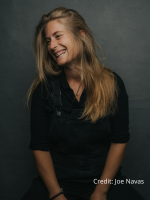This week marks the start of Passover. The first celebratory meal, known as the Seder, involves reading a sacred text called the Haggadah. But according to Jewish custom, it isn’t enough to just read the story—you’re supposed to actually experience the historic events that Passover celebrates by tasting symbolic foods. My friend Ed Miller, who I met up with by the bay in Provincetown, says that the Seder is an hours long meal with the food coming at the end.
"The food traditionally is — even though its very important — it’s not really all that good."
But Ed and his wife love to cook. So they’ve set out to change this. Step one was to give their Matzah a makeover. The Passover story starts with the Jews leaving Egypt in a hurry, with no time to wait for rising bread. Ed explains.
"So the matzah is one of the key food elements and it's flat and for a lot of people growing up it came in a box. But, we discovered a few years ago a wonderful recipe from Mark Bittman. It’s actually not exactly Matzah, it’s really Sardinian flatbread, or what they call carta musica," Ed says. "Which means sheet music, but it’s flour, water, salt, and olive oil and it’s really easy to make, and you know you mix it up and you bake it and it bakes really fast and it’s absolutely delicious."
Ed says he has to thank Mark Bittman, because this matzah alone has made the Passover meal much better. The next essential food element is the bitter herbs, which are often horseradish but could also be lettuce or endive.
"You’re remembering or imagining what it was like to be a slave. And so you take a chunk of horseradish and you put it on a piece of matzah and you eat it and you know ideally tears come to your eyes."
I asked, "is that bad?"
"Well it’s good," Ed says. "And bad actually, right? So there’s the bitter herbs are an essential part and then a third element is what’s called charoset."
Traditionally, charoset is a chopped apple and dried fruit mixture with nuts and cinnamon and wine.
"It’s like a relish or a paste that is supposed to symbolize the mortar that the slaves used to build the pyramids and other monuments of Ancient Egypt. But it’s also sweet, so it kind of has this dual role of reminding you again of the work of slavery but also of the sweetness of being liberated," Ed explains.
Ed makes his charoset with many of the traditional ingredients — apple, dates, walnuts, honey, and red wine. But he squeezes some lemon juice over the apples to keep them looking good and he toasts the walnuts, to boost their flavor. Most importantly, he minces the ingredients that need chopping, so that they’re small enough to stick together, but not obliterated into a true mortar-like paste.
"There are other ritual foods that are always on the table at the Seder. One of them is a roasted egg, which we often turn into deviled eggs, and the egg is sort of symbolic of the coming of spring and rebirth."
There’s also a roasted lamb shank bone, which Ed says symbolizes the sacrifice of a lamb that was part of the Passover celebration long before the Jews’ exodus from Egypt. Today for complicated and very specific religious reasons, you’re not supposed to eat lamb at Passover, so instead, the main event on Ed’s table is often something like brisket, seared halibut, or a rich chicken soup.
Ed says improvising or improving on the Passover celebration is actually a longstanding tradition — in fact, people are encouraged to embellish the story and add to it — and he thinks these sorts of improvements also can and should be encouraged when it comes to the food.








